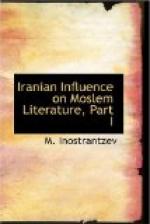Macedonian and the Parthian supremacy. With the
Sasanides the national reminiscences became clearer.
Round the founder of the dynasty were accreted, on
the one hand, legends wholly fabulous and on the other,
such as embodied excellent historical data. But
the latter seem to be inadequately represented in the
main work, the Khodayname. Again very few particulars
were known of the reigns of the succeeding sovereigns
down to Yezdegerd I. In the chapters which correspond
to those of the old Book of Kings just this want of
actual information, it seems, the compilers strove
to veil behind rhetorical accounts of scenes of homage
done to the rulers, imperial speeches from the throne,
etc. For the following ages on there was,
in general, good, partly very authentic information.
But this entire presentment did not concern itself
solely with veracity. The Iranians who from very
remote antiquity extravagantly lauded truth, had in
reality never any great sense of it. The Khoday
Nameh and kindred productions were unfairly biassed
and rhetorical. The ornamental and figurative
ingredients are indicated even by the Arabic reproductions,
though the latter are greatly condensed. A classic
testimony to it has been kindly communicated to me
by Baron Von Rosen which is a passage from a Petersberg
manuscript of Albayan Wattabyin of Jahiz in
which the Shuubiya or the Persians, who, though Muslims
placed their nation above the Arabs say: “And
he who is interested in reason, fine culture, knowledge
of ranks, examples and penalties, in elegant expressions
and superlative thoughts, let him cast a glance at
the History (more properly the Vitae) of Kings."
History of the Kings, Siyar-ul Muluk, is the
title of the Arabic rendering of the Book of Kings
in Pahlavi. Compare likewise Hamza’s remarks
on the works on Persian history. I have laboured
to show the partiality of the Persian tradition in
the footnotes. The narrative is conceived in
a monarchical and legitimistic spirit, but equally
all along from the view point of the superior nobility
and the clergy. Add to this the exertions to cry
up as much as possible the glory of Persia which sometimes
produces a strange effect. Moreover, there must
have been no lack of contradictions as to facts as
well as respecting estimates of personal character
which was inevitable owing to the employment of varying
sources. Nevertheless a work like this written
under the Sasanides and familiar with the state of
things obtaining in the empire and more or less of
an official nature, must have been an admirable fount
of history. There was hardly ever a better presentment
of the story of this house than the Khoday-Nameh.
[I have translated the entire passage from the since printed text. See p. 170.—G.K.N.]




